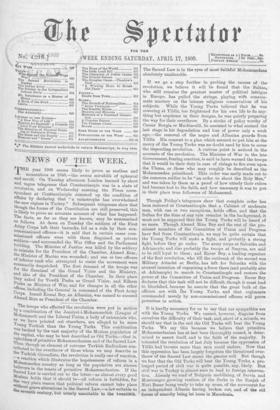The troops who effected the revolution were put in motion
by a combination of the Jemiyet-i-Mohammedieh (League of Mohammed) and the Liberal Union, a body of extremists who, Cta We have pointed out elsewhere, are alleged to be more Young Turkish than the Young Turks. This combination Was backed by the vast majority of the Moslem population of the capital, who may be best described as Old Turks,—that is, upholders of primitive Mohammedanism and of the Sacred Law. Thus, though an element of extreme Turkish Radicalism con- tributed to the overthrow of those whom we may describe as the Turkish Girondists, the revolution is really one of reaction, reaction which illustrates the hopelessness of reform in a Mohammedan country as long as the population are sincere behevers in the tenets of primitive Mohammedanism. If the Sacred Law is carried out to the letter—as almost every good liosletri holds that it should be—all reform is forbidden, for th.e very plain reason that political reform cannot take place Without grave alterations in the Sacred Law,—a law suitable to tile seventh century, but utterly unsuitable to the twentieth.
The Sacred Law is in the eyes of most faithful Mohammedans absolutely unalterable.






































